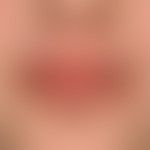Synonym(s)
DefinitionThis section has been translated automatically.
Frequent, therapy-resistant toxic degenerative eczema, which is chronified by permanent, even ticking licking with tongue and lips.
It can only be made to disappear by stopping the noxious agent.
In infants and toddlers it is also caused by constant wearing of pacifiers (see artefacts below).
S.a.u. eczema; see also Cheilitis simplex.
EtiopathogenesisThis section has been translated automatically.
You might also be interested in
ClinicThis section has been translated automatically.
Feeling of the constant "dryness" of the lips. Feeling of tension. Lip red rough, dry and flat parchment-like changes. Formation of fine to coarse scales. Formation of radial rhagades (pseudo-parrot furrows). Often combined with a pearlèche. In "pacifier children" a toxic-degenerative cheilitis with surrounding dermatitis limited to the contat area is observed.
TherapyThis section has been translated automatically.
The treatment depends on the respective diagnosis. Generally required is a good and intensified lip care with moisturizing and anti-inflammatory creams and skin care sticks (e.g. La Roche Posay Cicaplast Lip B5 Repairing Lip Balm) which should preferably not contain any colorants or preservatives. Good effects are achieved with pure vaseline (Vaselinum album), lanolin or ointments containing almond oil. In case of mycotic overgrowth antimycotics are applied. Bacterial infections are treated with disinfecting ointments or local antibiotics. If an underlying disease causes the lip changes, the disease has to be treated. Often an acne treatment with isotretinoin is the cause ("retinoid dermatitis"). If a contact allergy is suspected, an epicutaneous test should be performed. See also cheilitis simplex.
General therapyThis section has been translated automatically.
General guidelines:
- Avoid hot or too spicy food
- Thorough oral hygiene
- Do not constantly lick your lips instead of licking them - Use a grease pencil
- If necessary, have dentures adjusted even better and always clean them thoroughly
- No long-term medication with glucocorticoid ointments
- Pay attention to possible increased salivation in children
- For "dummy children", use smaller soothers if possible, minimise use if possible
- In acne treatment, look for alternative treatment options to retinoids.
NaturopathyThis section has been translated automatically.
Note(s)This section has been translated automatically.
Cheilitis can be caused by:
- Cold, windy weather
- UV rays (actinic damage; persons > 50-60 years)
- Atopic eczema (clarification of an atopic diathesis)
- Contact allergies (exclusion of a contact allergy)
- Chronic rhinitis
- Metabolic diseases, e.g. diabetes
- Vitamin or iron deficiency
- Acne treatment with isotretinoin
- Chemotherapies
- Chronified (tic-like) leakage mechanisms (see artifacts below).
- Permanent pacifier wearing.
Incoming links (6)
Artifacts; Artifacts; Cheilitis simplex; Para-artefacts; Skin picking syndrome; Sucking eczema;Outgoing links (6)
Artifacts; Cheilitis simplex; Eczema (overview); Isotretinoin; Perlèche (overview); Wool wax;Disclaimer
Please ask your physician for a reliable diagnosis. This website is only meant as a reference.







